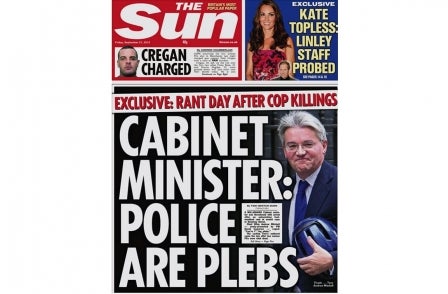
A Sun reporter whose phone records were illegally obtained by the Metropolitan Police has been granted no compensation by the Investigatory Powers Tribunal.
The court has ruled that its declaration the force had acted unlawfully was remedy enough.
The case judgment follows a legal challenge brought to the court by The Sun after the Met secretly viewed the call records of journalists Tom Newton Dunn, Craig Woodhouse, Anthony France and of the newsdesk.
The force viewed their call records in order to find and punish officers involved in leaking information about the Plebgate incident to The Sun.
The court ruled that in three cases the Met acted within the law, the Regulation of Investigatory Powers Act (RIPA), as it then stood.
However, it ruled that the journalists' Article 10 rights to freedom of expression were violated because the law failed to take into account the protection of sources.
The court said that this has now been remedied by the law-change last year – following the Press Gazette Save Our Sources campaign – which states police requests to view call records in order to identify a journalistic source must be approved by a judge.
The IPT ruled that the records grabs were proportionate because the police suspected officers were conspiring to discredit the cabinet minister at the centre of the Plebgate incident, Andrew Mitchell.
The court ruled however the grab of phone records and GPRS data, involving Woodhouse was unlawful because it was unnecessary – partly because the police already had the information they were seeking by other means.
The Sun sought compensation in all four cases. Three of these were dismissed by the court because the force acted within the law.
Woodhouse sought £10,000 in damages for "injury to feeling, distress and vindication of his right, aggravated by the large quantity of data obtained over nine days".
Sun lawyer Gavin Millar said Woodhouse was "horrified about how much information [the Met Police] now has about my confidential sources and my whereabouts during that nine-day period”.
He also told of the harm done to him in both his personal and professional life as a result of the accessing of his phone data by the police and the fact being known to his friends, family and potential
sources.
The lawyer for the Met questioned whether the breach had harmed Woodhouse's professional life, noting that he has been promoted to chief political correspondent.
The tribunal said: "We are not satisfied that this is a case in which the harm caused to Mr Woodhouse is such as to justify compensation.
"We are entirely satisfied that this is a case in which 'just satisfaction' is achieved by the judgment which we have given and the declaration which we are making."
Email pged@pressgazette.co.uk to point out mistakes, provide story tips or send in a letter for publication on our "Letters Page" blog
